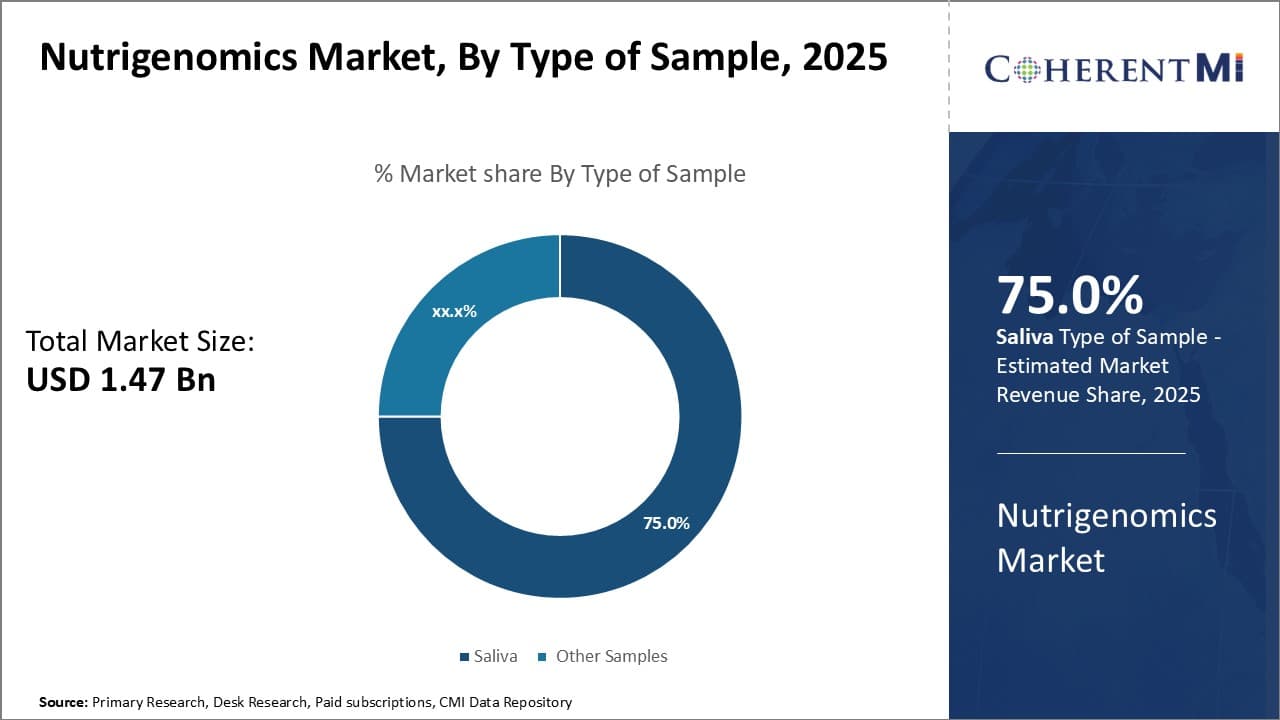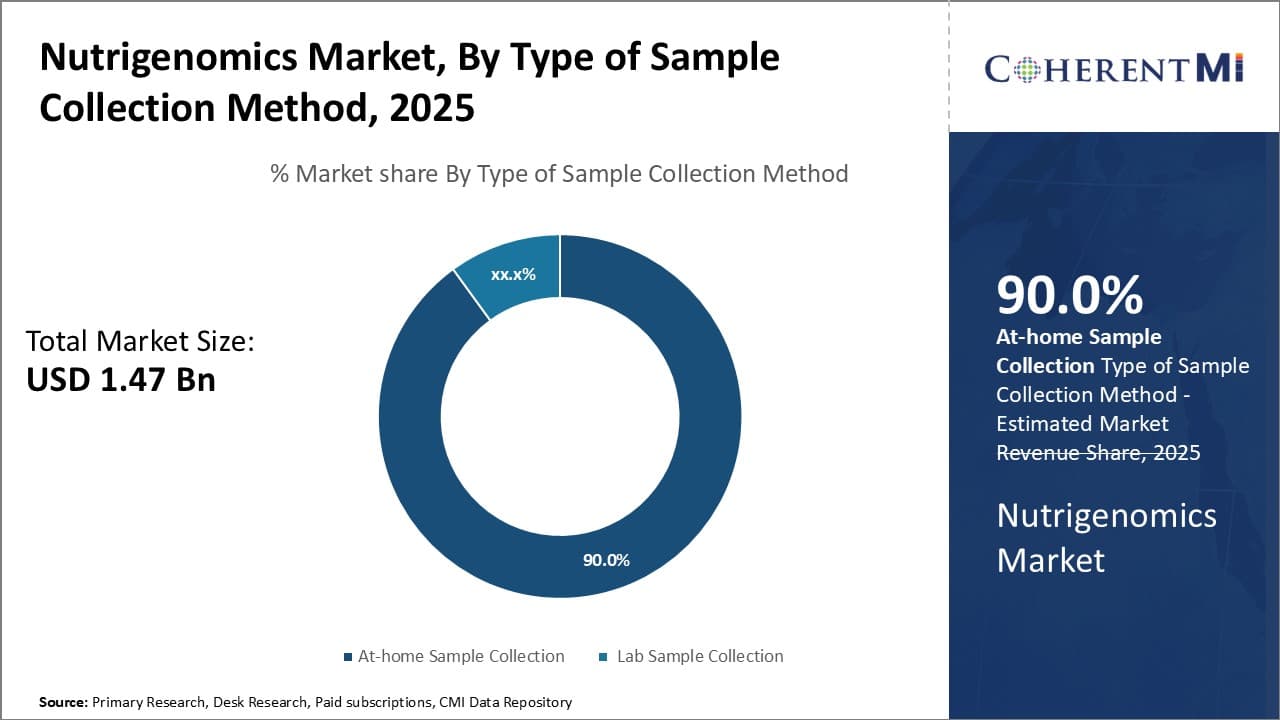

The Nutrigenomics Market is estimated to be valued at USD 1.47 Billion in 2025 and is expected to reach USD 3.50 Billion by 2032, growing at a compound annual growth rate (CAGR) of 13.2% from 2025 to 2032. Increased healthcare costs and rising focus on preventive healthcare are driving growth in the nutrigenomics market.
The rising prevalence of lifestyle diseases due to changing food habits and sedentary lifestyle has boosted the nutrigenomics market. Customized nutrition based on an individual's genetic makeup is expected to witness increasing demand. Growing applications of nutrigenomics in the development of personalized food and diet plans will also support market expansion over the forecast period.
Market Size in USD Bn
CAGR13.2%
| Study Period | 2025-2032 |
| Base Year of Estimation | 2024 |
| CAGR | 13.2% |
| Market Concentration | High |
| Major Players | 3X4 Genetics, Advanced Nutrigenomics, DNAlysis Biotechnology, DNA Health and Wellness, Geno Palate and Among Others |
Market Driver - Growing Demand for Personalized Medicine for Treating Chronic Diseases
With the evolution of science and technology, healthcare industry is transforming at a rapid pace. Chronic diseases which were challenging to treat in the past can now be managed better with the help of personalized medicine approach. Nutrigenomics is playing a pivotal role in enabling personalized nutrition through understanding how genes interact with dietary components.
As per research studies, almost half of the American population is suffering from at least one chronic health condition like heart disease, diabetes, cancer etc. Traditional "one-size-fits-all" treatment methods are not proving to be very effective for complex chronic diseases which differ widely between individuals based on their genetic makeup. This has increased the demand for more targeted therapeutic solutions tailored as per an individual's genetic profile. Nutrigenomics based personalized nutrition is helping in fulfilling this need to a great extent.
Through nutrigenomics, healthcare professionals can analyze an individual's genetic variations and recommend specific diet and lifestyle modifications best suited for their system. For example, some people may respond better to certain nutrients in preventing heart diseases compared to others based on their genetic risk factors. Such a tailored nutritional advice assists patients in managing their condition in a more effective manner with minimal side effects. This has become quite important especially for treating chronic diseases at early stages to delay further complications.
Overall, as prevalence of chronic illnesses continues to rise worldwide, demand for precise medical solutions catering to individual requirements is surging. Nutrigenomics is enabling development of precision nutrition approaches for leveraging diet in disease treatment and management according to genetic predispositions. This driver is certainly acting as a key growth factor for continued expansion of nutrigenomics market in the coming time.
Market Driver - Increasing Awareness About the Importance of a Nutrient-Rich Diet in Maintaining Good Health
In the modern fast paced lifestyle, maintaining a balanced diet has become quite challenging for majority of the population. People are becoming more reluctant towards healthy food options and preferring easily available junk alternatives. However, with increasing health consciousness, importance of nutrition is coming into spotlight once again.
Various awareness campaigns by health organizations as well as spread of health-related information through different online mediums is playing a significant role in educating masses about role of diet in overall wellbeing. People are realizing how even small adjustments in regular eating habits through inclusion of specific nutrients can help boost immunity, reduce inflammation and delay onset of many diseases. This new realization is compelling individuals to pay greater attention towards meeting their daily nutritional requirements.
Moreover, link between diet and genetic makeup is also being strongly emphasized now. Concepts like nutrigenetics and nutrigenomics are effectively conveying how each person has a unique nutritional needs basis their genetic profile. This awareness is encouraging self-analysis to better understand individual nutritional predispositions and accordingly enrich dietary patterns. With easy access to direct-to-consumer genetic testing services, more individuals are willing to analyze their genetic risk factors and make appropriate diet modifications.
The growing nutrition knowledge is expected to encourage adoption of precise, gene-guided diets over time. This expanding awareness regarding value of nutritional genomics in promoting optimum health will definitely drive increased demand for relevant diagnostic services. Overall, enhanced focus on preventive healthcare through customized diet plans tailored to genes is a key factor driving growth of nutrigenomics industry.
 To learn more about this report, Download Free Sample Copy
To learn more about this report, Download Free Sample Copy
Market Challenge - Ethical and Regulatory Challenges
The nutrigenomics market faces significant ethical and regulatory challenges that hinder its growth potential. As nutrigenomics aims to provide personalized nutrition recommendations based on an individual's genetic profile, it brings up serious privacy concerns regarding how people's genetic data will be collected, stored and utilized. Strict regulations and oversight are required to ensure genetic test results and gene-based dietary advice are kept confidential and secure. Additionally, the accuracy and clinical validity of nutrigenomic tests are still being established, requiring careful evaluation of the health claims and recommended interventions made based on their results. Regulators need to closely monitor nutrigenomic products and services to protect consumers from possible overpromising or misleading marketing. The lack of comprehensive and harmonized regulations globally also poses regulatory compliance difficulties for companies operating internationally. Overall, addressing legitimate ethical issues around privacy protection and establishing an evidence-based regulatory framework are crucial for nurturing consumer and clinical acceptance of this promising new field.
Market Opportunity - Integration of Nutrigenomics with Artificial Intelligence for Market Opportunities
The integration of nutrigenomics with artificial intelligence technologies can unlock tremendous opportunities for growth in the nutrigenomics market. AI can help enhance the clinical validity, actionability and scalability of nutrigenomic testing and recommendations. Through machine learning techniques, AI systems can leverage big datasets that combine individuals' genomic profiles, health records, lifestyle habits and outcomes to continuously refine nutrigenomic models and generate more precise and personalized diet and lifestyle advice. AI chatbots or virtual health coaches powered by nutrigenomic data could assist widespread population self-management. Integrating nutrigenomic profiles into AI platforms for precision nutrition and digital therapeutics also allows continual monitoring of outcomes and refinement of interventions on a large scale. Overall, combining nutrigenomics with AI’s capabilities in advanced analytics, automation and scaling presents exciting possibilities for making personalized nutrition approaches more viable, accessible and effective for improving health globally.
Strategic collaborations and partnerships have been a critical strategy for players to gain a competitive edge in the nutrigenomics market. In 2016, GenoPalate partnered with DNAFit, a leading DNA testing company, to develop a nutrigenomic test that analyzes an individual's DNA and provides personalized nutrition recommendations. This partnership allowed both companies to leverage their respective strengths in genetics and nutritional analysis to expand their customer base.
Product innovation and customization based on genomics insights have also proven effective. In 2014, Nutrigenomix launched the world's first genetic test that assesses dietary needs based on an individual's DNA profile. It analyzes over 50 key genes related to nutrition, weight management and health to provide highly customized diet and supplement recommendations. Their ability to offer targeted solutions based on genetic risks has helped attract many new clients.
Adopting direct-to-consumer marketing approaches has helped players scale up rapidly. For instance, in 2018, Habit utilized social media influencers and digital campaigns on platforms like Instagram and Facebook to promote its at-home nutrigenomic testing kits. Within a year, it saw over 50% growth in sales, mainly driven by word-of-mouth promotion through their network of influencers who highlighted the personalized reports.
Entering new geographic markets presents continual opportunities. In 2019, DayTwo expanded from the US and Israel into new European countries like Germany, Spain and Italy by partnering with local medical providers and insurance companies. Their early globalization approach has positioned them favorably compared to competitors focused only on domestic opportunities.
 To learn more about this report, Download Free Sample Copy
Insights, By Type of Sample: Non-invasive Nature and Ease of Collection of Saliva
To learn more about this report, Download Free Sample Copy
Insights, By Type of Sample: Non-invasive Nature and Ease of Collection of Saliva
In terms of type of sample, saliva sub-segment contributes the highest share of 75% in the market owning to its non-invasive nature and ease of collection.
The saliva segment dominates the nutrigenomics market due to various factors. As a type of sample, saliva scores high on convenience as it can easily be self-collected without any professional help or medical equipment. The non-invasive collection method makes patients and consumers comfortable providing samples from the comfort of their homes. Saliva mirrors the body's physiological state and contains biomarkers that can be tested to gain meaningful health insights. Compared to other sample types like blood or urine that require venipuncture or more intensive collection methods, saliva is the least intrusive. It has gained popularity among people looking for genetic or biometric testing tied to nutrition, lifestyle or disease risk assessment. The pain-free, hassle-free collection elevates compliance for regular or long-term monitoring of health conditions using saliva samples.
 To learn more about this report, Download Free Sample Copy
To learn more about this report, Download Free Sample Copy
Insights, By Type of Sample Collection Method: Increased Accessibility and Convenience of At-home Sample Collection
In terms of type of sample collection method, at-home sample collection sub-segment contributes the highest share of 90% in the market owing to increased accessibility and convenience.
The at-home sample collection method has become the preferred option over lab sample collection in the Nutrigenomics market. It empowers individuals to self-administer sample collection like saliva or at their convenience according to the test requirements instead of visiting diagnostic labs or hospitals. This unprecedented accessibility and flexibility boost the volume of tests performed. People appreciate the privacy and comfort of collecting samples from their homes without disrupting their daily routine. The recent pandemic has further prompted a shift to more at-home health management solutions including sample collection. Companies offering mail-in sample collection kits have simplified the process through clear instructions and packaging design. At-home collection lifts unnecessary burdens on healthcare infrastructure and allows scaling up preventive screening. The hyper connectivity available through digital and remote interfaces aids supervision of unassisted at-home collection procedures.
The major players operating in the Nutrigenomics Market include 3X4 Genetics, Advanced Nutrigenomics, DNAlysis Biotechnology, DNA Health and Wellness, Geno Palate, Mapmygenome, Nutrigenetics, Vieroots and Vitagenum.
Would you like to explore the option of buying individual sections of this report?
Sakshi Suryawanshi is a Research Consultant with 6 years of extensive experience in market research and consulting. She is proficient in market estimation, competitive analysis, and patent analysis. Sakshi excels in identifying market trends and evaluating competitive landscapes to provide actionable insights that drive strategic decision-making. Her expertise helps businesses navigate complex market dynamics and achieve their objectives effectively.
Nutrigenomics Market is Segmented By Type of Sample (Saliva, Other Samples), By Type of Sample Colle...
Nutrigenomics Market
How big is the Nutrigenomics Market?
The Nutrigenomics Market is estimated to be valued at USD 1.47 in 2025 and is expected to reach USD 3.50 Billion by 2032.
What are the major factors driving the Nutrigenomics Market growth?
The growing demand for personalized medicine for treating chronic diseases and increasing awareness about the importance of a nutrient-rich diet in maintaining good health are the major factors driving the Nutrigenomics Market.
Which is the leading Type of Sample in the Nutrigenomics Market?
The leading Type of Sample segment is Saliva.
Which are the major players operating in the Nutrigenomics Market?
3X4 Genetics, Advanced Nutrigenomics, DNAlysis Biotechnology, DNA Health and Wellness, Geno Palate, Mapmygenome, Nutrigenetics, Vieroots, and Vitagenum are the major players.
What will be the CAGR of the Nutrigenomics Market?
The CAGR of the Nutrigenomics Market is projected to be 13.2% from 2025-2032.